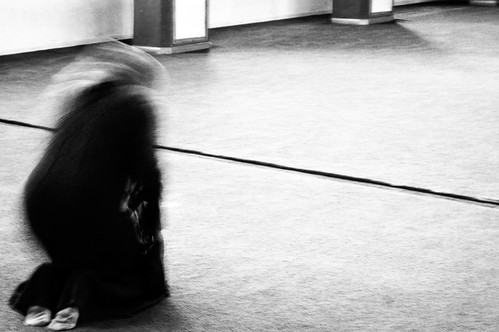1. the worship of traders: i have been listening to ustadh abdullah ali's 'the essentials of faith' from zaytuna's distance learning course. i really enjoy the cadence of his voice. he made several insightful points, but the one that heavily resonated with me was his commentary on categories of intentions and worship. in providing daleel for his insight, he referenced first hadith:
FIRST HADITH
From the Amir al-Muminin Abu Hafs 'Umar ibn al-Khattab, radiya'llahu 'anhu, that he said, "I heard the Messenger of Allah, may Allah bless him and grant him peace, saying, 'Actions are only by intentions, and every man has only that which he intended. Whoever's emigration is for Allah and His Messenger then his emigration is for Allah and His Messenger. Whoever's emigration is for some worldly gain which he can acquire or a woman he will marry then his emigration is for that for which he emigrated'." The two Imams of the hadith scholars narrated it - Abu Abdullah Muhammad ibn Isma'il ibn Ibrahim ibn al-Mughirah ibn Bardizbah al-Bukhari and Abu'l-Husein Muslim ibn al-Hajjaj ibn Muslim al-Qushayri an-Naysaburi - in their two sahih books which are the most sahih books compiled.in ustadh abdullah ali's commentary, he discussed three kinds of worship and intention: worship of slaves, worship of traders, and worship of love. in imam an-nawawi 'the complete forty hadith,' nawawi commentary is along the lines of ustadh abdullah ali's:
The hadith indicates that intention is the measure for rendering actions true, so that where intention is sound action is sound, and where it is corrupt then action is corrupt.
Wherever there is action accompanied by intention, then there are three states:
First, that one does it out of fear of Allah ta'ala, and this is the worship of slaves.
Second, that one does it seeking the Garden and reward, and this is the worship of traders.
Third, that one does it out of modesty and shame before Allah ta'ala, discharging the right of service and discharging [the duty of] gratitude, seeing oneself along with that falling short, and along with that one's heart is fearful because one does not know whether one's action is accepted or not. This is the worship of free people, and the Messenger of Allah, may Allah bless him and grant him peace, indicated it when 'A'ishah, radiya'llahu 'anha, said to him, when he stood at night until his two feet swoll, "Messenger of Allah, why do you impose this upon yourself whilst Allah has forgiven you your earlier errors and any later ones? " He said, "Shall I not be a grateful slave?"
If it is said, "Is it better to worship with fear or with hope?" It must be said, "Al-Ghazali said, may Allah show mercy to him, 'Worship with hope is better because hope causes love and fear causes despair'." read morethere are some days when i know i worship due to fear, many others when i worship as a trader. inshaAllah i began to worship and behave out of love. there is an emptiness that consumes me when i know i made those rakats because i feared hell fire, rather than because i love Allah and the beauty that is born in those moments of sujood.
2. nurturing a relationship with Allah: this morning, i realized something: subconsciously or not, we spend far too much of our life seeking the love and affection of another in this dunya. unlike our relationships with human beings, Allah's standards and expectations are constant, transparent, readily accessible. without hidden surprises, implied meaning, growing closer to your creator is much easier than we've imagined. but, why do we devote so little time to nurturing this relationship? it seems that to truly and deeply love Allah, you must render other relationships of limited significance. how many of us are willing to do this considering the alienation that will surely develop.
3. the beauties of alienation: i am reminded of a sufi aphorism from ibn ata’illah:
When He alienates you from his creatures, then know that He wants to open for you the door to intimacy with Him.
this aphorism draws me toward a moment of calm and reflection. alienation is traditionally looked at as a negative state, rather than an opportunity to grow closer to Allah. sometimes we do not recognize the need to nurture our relationship with Allah because we are distracted. Allah takes away those distractions one by one until we have nothing left. we are then reminded of the ephemeral nature of this dunya and the permanency of Him, His love, and His mercy. we are reminded that we can only rely on Him.
4. the true believer: “none of you [truly] believes until he wishes for his brother what he wishes for himself.” 40 Hadith. considering this, are there any true believers? how many of us want from our brother or sister what we wish for ourselves?
5. the incredible shrinking stomach: i broke fast today, saying 'allahumma laka sumtu wabika a manty wa'alaika tawakaltu, wa'ala rizquka afartu' or 'o Allah, i fasted for your sake. i believed in You and relied on You and i break my fast on your provisions.' after i made this du'a i was so excited to eat, but i have noticed a substantial decrease in my appetite. suhoor is difficult because i do not feel like eating and iftar is forceful because the smallest amount of food makes me full. today, i drank a glass of water and ate a few berries and i was suddenly full. around midnight, i forced myself to eat. i feel sick.
iftar #9: protein shake, honest tea, blackberries, raspberries & orange slices.
suhoor: hemp seed granola, rice milk, black berries.
iftar #4: blue chips & francessi.




1 comments:
great post, great blog. love the title.
Post a Comment